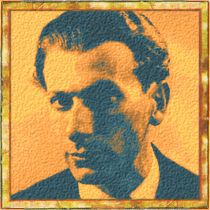[biography] - [quotes] - [publications]

 he
poem gains its form like the
he
poem gains its form like the
raindrop. The water gathers,
takes form, lengthens,
then it falls off and while falling,
it forms a perfect drop.
(Miklós Radnóti)
1909 born in Budapest
1929-34 While studying French and Hungarian at the University of Szeged,
he joined the Art Forum of Szeged Youth, an association founded by left
wing intellectuals and artists.
1934 Obtained Ph.d. in Hungarian Literature. He moved to Budapest, got
married and became a frequent contributor to Nyugat (Occident), the
most prestigious literary journal, as a member of its "third generation".
1937 Won the prestigious Baumgarten Prize.
1931-39 Three visits to Paris.
1938 According to anti-Jewish measures he was identified as a Jew and
called up to a labour battalion for three months (in 1940) then ten
months (1942-43).
1943 Converted to Catholicism.
1944 Deported to the labour camp in Bor (Yugoslavia), forced to march
towards Germany, and shot dead by soldiers of the armed forces near
a West-Hungarian village, Abda.
One of the most eminent poets of the 20th century, Radnóti
translated widely from classical Greek and Latin as well as English,
French and German poetry.
"He framed poetic innovation in the pattern of the lyrical tradition,
combining the classical forms of the ancients with modern sensibilities.
Essentially, the more chaotic and barbaric the age, the tighter and
more refined became his poems' designs. Some poems, cast in ancient
meters, ring with prophetic power. Others, in delicate invented forms,
create the most exquisite crystalline tones. They produce magic, conjuring
up the unprecedented without becoming obscure." (Zsuzsanna Ozsváth)
[biography] - [quotes] - [publications]
 |
Frankfurt '99
Non-profit Organisation,
Budapest 1054 Báthori u. 10. Fax: +(36) 1 269 20 53 E-mail: frankfurt_99.kht@mail.matav.hu |
|